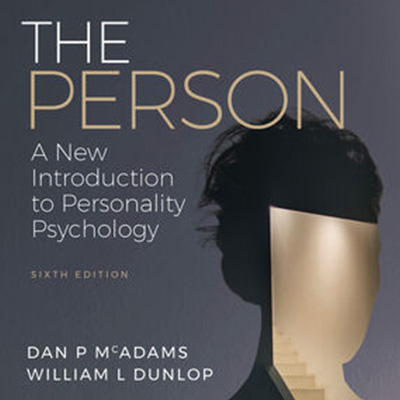McAdams’ New Book Puts The ‘Person’ Back into Personality

The latest book by Northwestern University’s Dan P. McAdams brings personality psychology alive by combining cutting edge research with the personal stories of more than two dozen celebrities, writers, entrepreneurs, and other notable figures.
In the newly revised, sixth edition of The Person: A New Introduction to Personality Psychology, McAdams and William Dunlop encourage readers to consider what it really means to be a person and how we differ from one another, using case studies of everyone from Lady Gaga and Ernie Banks to Salman Rushdie and Steve Jobs.
Compared with other psychology textbooks, this one is “more personal, more intellectually probing – and it takes a strong point of view,” said McAdams, interim dean of the School of Education and Social Policy and the Henry Wade Rogers Professor of Psychology. “We are putting the person back into personality.”
While The Person targets undergraduate students of personality psychology, it’s also designed for non-psychology majors and a broad audience of students and laypeople who are interested in what makes personalities unique.
Nearly every chapter includes important historical context. But the authors happily jettisoned a good chunk of personality research that occurred prior to 2000, focusing instead on current issues and concerns. Certain classic studies made the cut if they were deemed relevant today and “if their venerable theoretical traditions have had a far-reaching influence,” McAdams said.
The case studies, sprinkled throughout the chapters, each illustrate a key area or idea in personality psychology. Lady Gaga, for example, introduces the concept of a person as a social actor -- or someone’s’ overall style of relating to others.
“Like actors on a stage, human beings play roles and perform social behaviors,” McAdams wrote. “Consistent variations in actors’ styles of performance are captured in personality traits such as extraversion and openness to new experiences, which appear to be especially salient in Lady Gaga’s life.”
In a chapter on social learning and culture, celebrated writers Eva Hoffman and Salman Rushdie illustrate how different cultures can coexist within the same person.
Hoffman describes how she struggled to reconcile her Polish ancestry with her life in North America and how her bilingualism formed her identity. For Rushdie, the clash of cultures made him the decades-long target of a world-wide order of assassination.
“Culture infuses virtually every aspect of human personality,” McAdams wrote. “In ways both trivial and profound, culture serves as the most pervasive context for understanding who people are and what they do.”
 McAdams, who pioneered the field of narrative identity in the 1990s and early 2000s, established the life-story approach to the study of personality and life-span developmental psychology. In his groundbreaking book, The Redemptive Self: Stories Americans Live By, McAdams proposed that identity is a broad and integrative story that a person tells about themselves.
McAdams, who pioneered the field of narrative identity in the 1990s and early 2000s, established the life-story approach to the study of personality and life-span developmental psychology. In his groundbreaking book, The Redemptive Self: Stories Americans Live By, McAdams proposed that identity is a broad and integrative story that a person tells about themselves.
“People integrate the different parts of themselves – past, present, and future—by construct a story about it all,” he wrote. “Beginning in late adolescence and young adulthood, people selectively remember the past and anticipate the future to create an internal narrative that explains who they are, how they have come to be, and where their lives may be going.”
The Redemptive Self: Stories Americans Live By won the American Psychological Association's William James Award for the best general-interest book published in psychology in 2006. McAdams also won the Jack Block Award for career contributions to personality psychology, the Henry A. Murray Award for excellence in the study of lives, and the Theodore Sarbin Award for contributions to philosophical and theoretical psychology.
Throughout his career, McAdams has authored nearly 300 articles and chapters and eight books, including psychological biographies of George W. Bush and Donald Trump.
McAdams dedicated The Person to Dunlop, who was associate professor of psychology at University of California, Riverside, and a visiting professor at Aarhus University in Denmark, before his death in 2021. Dunlop was a leading authority on the study of meaning making, life narrative, the contextualization of personality and identity, and the development of personal relationships. Dunlop was named a Rising Star by the Association for Research in Personality.